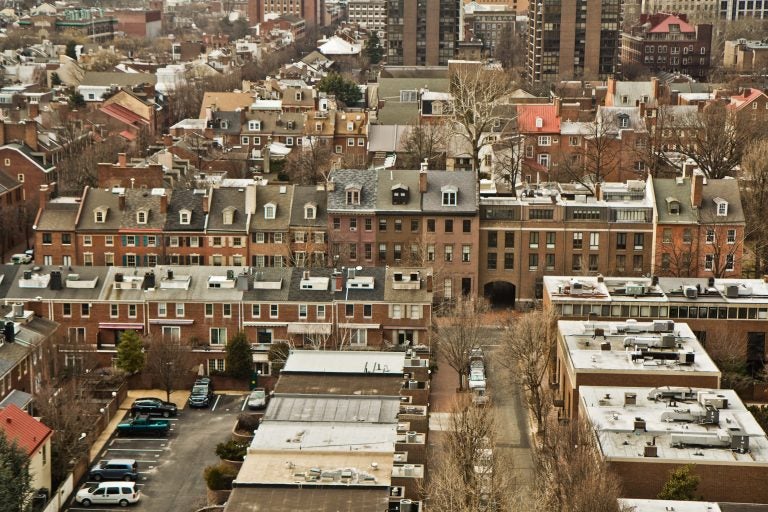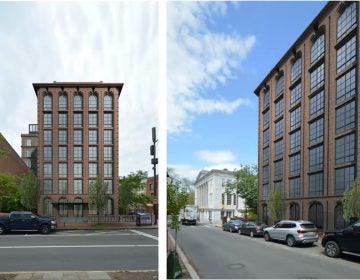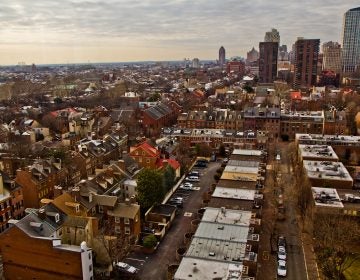City Council approves bill allowing down zoning for Society Hill
Included are strict new building-height limits, increased parking requirements, and an end to bonuses and exemptions in the name of historic preservation.

A view of Society Hill taken from inside the Society Hill Towers. (Kimberly Paynter/WHYY)
Philadelphia City Council voted unanimously Thursday to pass a measure that will allow down zoning of much of Society Hill.
The bill, introduced in January by City Councilmember Mark Squilla, includes new strict height restrictions for buildings, increased parking requirements, and the elimination of bonuses and exemptions in the name of historic preservation.
Opponents of the bill said it will only serve to prevent any affordable, multi-family housing from being developed in the area, thereby preserving not just its historic character but also its largely white and wealthy residential makeup.
“Letting a handful of residents define Society Hill’s urban context, while ignoring its history of wanton urban renewal that demolished ‘nonconforming’ mid-rises, is the epitome of hypocrisy and the opposite of good preservation policy,” Benjamin She, a volunteer for the urban advocacy group 5th Square, said in prepared testimony.
Society Hill today is in large part the result of urban renewal policies and blight clearance in the 1960s.
“Society Hill was and always will be part of Center City, and it’s exactly where we should be providing abundant housing for all income levels for maximum opportunity and minimum risk of displacement,” She’s statement read.
Society Hill Civic Association president Larry Spector stressed that the bill aimed only to preserve the scale and historical character of the area, and took issue with it being classified as NIMBY-ist.
“This is not an anti-affordable housing effort,” said Spector, who lives at Sixth and Addison streets and has been in the neighborhood for over 30 years.

Subscribe to PlanPhilly
He pointed to the proposed development on the 200 block of Walnut Street, across from the Merchants’ Exchange building, the likes of which the bill was designed, in large part, to prevent. Spector argued that, as it stands, there is nothing that acts as an incentive to affordable housing in Society Hill because any developer who wants to build a high-rise building in the neighborhood can get permission to do so from the city by simply contributing to the city’s affordable housing fund, thereby skirting any requirement to include units below market-rate.
“Not only do they then not have to put in affordable housing, but they get a bonus to be able to create a higher building and more units,” he said.
Spector said he would not oppose a mandatory affordable housing requirement for new development in Society Hill.
As approved, the bill does not include such a requirement.
The council approved the zoning changes, 17-0. Councilmember Kenyatta Johnson spoke in support of the changes, and described the process as an inclusive one.
“I know it’s very hard to balance the needs when you have aggressive developers who are building and they just want carte blanche for the opportunity to build when they see fit,” Johnson said. He commended Squilla for working closely with the residents who will be affected.
The City Planning Commission had voted against the rezoning in the past. This was the second time around for the Society Hill carve-outs before the council — Mayor Jim Kenney vetoed them at the end of 2019, describing them as “burdensome restrictions on development” that “may inhibit creation of new affordable housing units on blocks that are very transit-oriented, accessible to jobs and amenities, and designed for multiple units.”
The mayor’s office did not immediately respond to a request for comment on the council’s vote Thursday.
WHYY is your source for fact-based, in-depth journalism and information. As a nonprofit organization, we rely on financial support from readers like you. Please give today.







